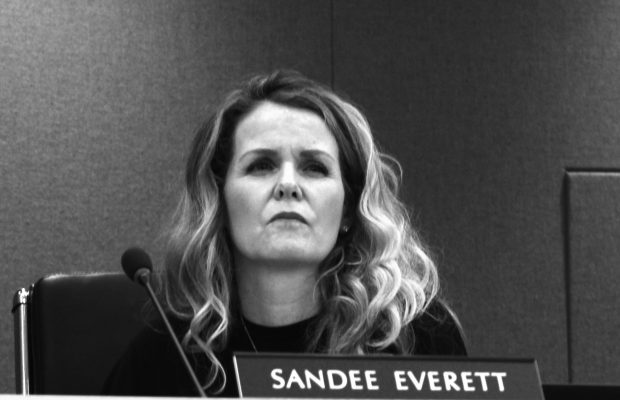School board violates Brown Act

Following public complaint as to whether the actions taken by CVUSD board members at the most recent board meeting on May 15 were lawful, a statement was issued on May 25 by Thomas Frye, Deputy District Attorney of Ventura County, finding board Vice President Sandee Everett guilty of violating the Brown Act.
At the board meeting on May 15, board policy 6161.1: Selection and Evaluation of Instructional Material, commonly known as the “opt-out policy,” appeared again as an action item on the agenda. Everett proposed a series of amendments, which she provided to fellow trustees in a packet at the beginning of the discussion session. However, as published by the Acorn on May 24, a request to obtain a copy was denied at the time of photocopying. Everett specifically instructed Hyonchin Im-Turner, CVUSD clerk, about when copies would be distributed and to whom.
Rocky Capobianco, community member, was present for this interaction. “I was the only community member in the board room when (Everett) arrived (before closed session) and I witnessed her handing Hyonchin Im-Turner the amendments, asking for her to make copies (for board members and administrators) but to wait until the agenda item before distributing copies to board members only,” Capobianco wrote in an email to the Prowler.
According to the Acorn, Everett told Im-Turner to make copies for trustees and district staff, but that she wishes more copies had been made to leave on the back table of the board room for the public. Everett claimed that “failure to make extra copies for the public was a simple oversight.”
Conflict arose as to whether withholding these documents from those who requested them violated the Brown Act. There was also speculation that board members were exposed to possible amendments before they were disclosed to the public, as only members Phelps and Connolly requested more time to look over the specifics.
When asked about the legality of board actions at the most recent meeting, Everett denied violation of the Brown Act, claiming that her discussion with John Andersen, board president, was within their jurisdiction. “I had a prior discussion with the superintendent and Mr. Andersen regarding changes to the CDE (California Department of Education) annotations and possible solutions, but, as per the Brown Act, I did not discuss or email any other board member regarding what I would propose for my amendments,” Everett wrote to a Prowler reporter in an email on May 23.
The Brown Act ensures the right of the public to remain active in and informed of school board actions. It also outlines board meeting guidelines and codes of conduct that must be abided by. Government Code section 54957.5 states: “writings, when distributed to all, or a majority of all, of the members of a legislative body of a local agency by any person in connection with a matter subject to discussion or consideration at an open meeting of the body … shall be available upon request without delay,” and must not be withheld from public inspection.
Recently, a letter from Frye, addressed to Andersen, warned the board that refusal to distribute the amendments to those who requested a copy was, in fact, a Brown Act violation. Possible consequences could include revoting on the item to receiving a cease-and-desist letter.
In this letter, Frye wrote: “Because the document was created by a trustee and was distributed to the board during a public meeting, the Brown Act required it to be made available for public inspection at the meeting. The failure to make this document available to the public at the meeting was a violation of the Brown Act.” According to the CVUSD Board Bylaw, it is the board President’s responsibility to “Enforce the Board’s policies relating to the conduct of meetings and help ensure compliance with applicable requirements of the Brown Act.” Frye specified that it is yet to be determined whether legal action is appropriate, depending on future complaints.
Everett passed out her packet at the beginning of the review session, making a motion to approve the new policy while simultaneously passing out the packet to fellow board members to see for the first time. Her motion was seconded by Dunn before she listed the specifics of her proposal. Some board members were more skeptical about the motion, as there were many amendments and only a short time for board discussion.
“We are going to look at stuff that none of us have seen, and I think it would be a very good idea for us to establish a discussion session so we can look at all these amendments,” Pat Phelps, trustee, said. Having never before seen the 17 page document, Connolly requested a 15 minute recess to allow herself time to properly read the new policy, and was granted a four minute break. Some community members questioned whether refusal to postpone the decision to a later meeting as to allow adequate time for board and community review was also a Brown Act violation, but Frye affirmed the legitimacy of the board’s decision.
In the new policy, Everett included a clarification statement requiring a parent signature on the opt-out syllabus. It was also proposed that the warning asterisk referencing a list of books of the October 2017 CDE annotations of books containing adult content remain on the syllabus, despite the redaction of the list by the CDE shortly after the first CVUSD opt-out policy was administered.
In a summary cover memo of a conference call on Dec. 21, primary CDE coordinators conducted an investigation of the annotations on controversial books due to their use in the CVUSD board’s opt-out policy. The Professional Learning Support Division recommended that “The caveats be immediately removed from all titles in addition to any other language that may act as what the American Library Association calls ‘prejudicial labeling.’”
Despite the CDE’s updated position on the asterisks, there was dispute as to whether the asterisk referencing books with “adult themes” is still valid. “The reasoning (the CDE) provided to the Acorn was because they believe society has changed and no longer finds the content in the books with these disclaimers troubling,” Everett said, referencing the CDE’s decision to redact the list. “I strongly disagree with the CDE’s new reasoning because the graphic content that is actually found in some of our books is still troubling and not acceptable to society,” Everett said.
Under the new proposed policy, students who choose to opt-out will be allowed a separate learning environment but can decide to remain in their original class for the duration of the assignment as well. Teachers and community members spoke at the meeting to express their thoughts on this option.
“I question if my comments even matter to you, or worse, if there will be negative, personal or professional consequences for speaking out,” Jill Magnante, teacher, said during public comments. “Teachers are following the directions of the district and the parameters of the policy … and we have relayed our concerns to administration, not because any of us (are) asking to eliminate the policy, but because we want to do the best that we can to accommodate the needs of all of our students and protect the integrity of our instruction.”
NPHS is currently administering two alternate assignments, “Wuthering Heights” and “Our Town”, in place of the standard novels. Christine Hodson, English teacher, wrote an alternative assignment recently. “We didn’t have the time that a teacher would usually spend developing any kind of a unit plan for a literary work,” Hodson said, specifying that the student who chose to opt out worked independently in the library and at home on assignments. “(students who opt out) are just bereft of the experience and points of view of other people. We expand our own consciousness and our own skills in decoding information that we can see through the eyes of another person.”
Hodson emphasized teacher dedication to conforming to policy guidelines. “If a student requests an opt out, the teachers, the school administration, and the district office find ourselves bending over backwards to accommodate and be sensitive,” Hodson said.
Although many teachers have voiced dissatisfaction and frustration with Everett’s refusal to use the drafted policy the teachers’ committee wrote, Everett commented that she has listened to teacher comments thoroughly, and is confident in the current policy. “In the future, if the alternative assignment process creates a lot of additional work for teachers, which I do not believe will happen, we can revisit the policy and make adjustments,” Everett said.
Currently, there is only one available opt-out assignment– to read “Our Town,” a ninth grade play. As such, students who have opted out of two consecutive assignments in tenth grade would have done the same assignment twice.
Magnante, like Phelps, called for a tabling of the item for further teacher-board discussion. Several other community members called for an allowance of time for the people and for district members to process the proposed amendments. A motion, proposed by Phelps, to table the discussion, failed with Dunn, Andersen and Everett voting to pass the amendments without further discussion.
Everett’s amendments passed after several hours of discussion in a 3-2 vote, with Betsy Connolly and Phelps voting against the amendments.




6 Comments